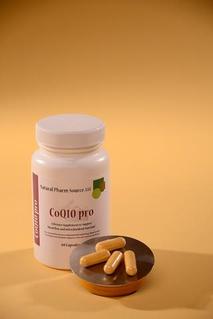Does Coenzyme Q10 Reduce Statin-Related Muscle Aches?

10/2018
By Richard Klasco, M.D.
Q. Does coenzyme Q10 help to reduce muscular issues and other negative side effects associated with statins? And if so, should doctors give this information to patients when statins are prescribed?
A. Coenzyme Q10, a popular dietary supplement marketed as CoQ10 “to promote heart health,” probably does not reduce statin-induced muscle problems.
In 1957, researchers at the University of Wisconsin discovered a moleculethat helps muscle cells generate energy. Today, that molecule is commonly known as coenzyme Q10.
In 1978, investigators, including Dr. Michael Brown and Dr. Joseph Goldstein, who would go on to win the Nobel Prize, noted that cholesterol and coenzyme Q10 are synthesized by the same biochemical pathway. As a result, statins not only lower cholesterol levels, they also deplete the body’s stores of coenzyme Q10.
This finding renewed interest in coenzyme Q10. Was its depletion the cause of statin-induced muscle aches? If so, could restoring coenzyme Q10 to normal levels with supplements counteract these problems? This theory attracted many proponents, including Dr. Brown, who in 1989 filed a patent on coenzyme Q10 as a treatment for statin-induced muscle problems.
In the ensuing years, coenzyme Q10 was studied extensively as a treatment for statin-induced muscle problems. But the studies yielded conflicting results.
In 2015, the Lipid and Blood Pressure Meta-analysis Collaboration Group combined data from six randomized controlled trials of coenzyme Q10 as a treatment for statin-induced muscle problems. Their meta-analysis of 302 patients concluded that coenzyme Q10 was not beneficial. A subsequent randomized controlled trial of coenzyme Q10 in 41 patients with proven statin-induced muscle problems reached the same conclusion.
Rigorous studies of coenzyme Q10 for other medical conditions — such as heart failure, Parkinson’s disease and Huntington’s disease — have also found it to be ineffective.
Some argue, with some justification, that the studies of coenzyme Q10 were not large enough, or were not long enough, or used various preparations and doses of coenzyme Q10. Still, considering the preponderance of evidence, there is no proof coenzyme Q10 helps prevent statin-induced muscle problems.
In 2015, the Lipid and Blood Pressure Meta-analysis Collaboration Group combined data from six randomized controlled trials of coenzyme Q10 as a treatment for statin-induced muscle problems. Their meta-analysis of 302 patients concluded that coenzyme Q10 was not beneficial. A subsequent randomized controlled trial of coenzyme Q10 in 41 patients with proven statin-induced muscle problems reached the same conclusion.
Rigorous studies of coenzyme Q10 for other medical conditions — such as heart failure, Parkinson’s disease and Huntington’s disease — have also found it to be ineffective.
Some argue, with some justification, that the studies of coenzyme Q10 were not large enough, or were not long enough, or used various preparations and doses of coenzyme Q10. Still, considering the preponderance of evidence, there is no proof coenzyme Q10 helps prevent statin-induced muscle problems.
https://www.nytimes.com/2018/10/05/well/live/does-coenzyme-q10-reduce-statin-related-muscle-aches.html
By Richard Klasco, M.D.
Q. Does coenzyme Q10 help to reduce muscular issues and other negative side effects associated with statins? And if so, should doctors give this information to patients when statins are prescribed?
A. Coenzyme Q10, a popular dietary supplement marketed as CoQ10 “to promote heart health,” probably does not reduce statin-induced muscle problems.
In 1957, researchers at the University of Wisconsin discovered a moleculethat helps muscle cells generate energy. Today, that molecule is commonly known as coenzyme Q10.
In 1978, investigators, including Dr. Michael Brown and Dr. Joseph Goldstein, who would go on to win the Nobel Prize, noted that cholesterol and coenzyme Q10 are synthesized by the same biochemical pathway. As a result, statins not only lower cholesterol levels, they also deplete the body’s stores of coenzyme Q10.
This finding renewed interest in coenzyme Q10. Was its depletion the cause of statin-induced muscle aches? If so, could restoring coenzyme Q10 to normal levels with supplements counteract these problems? This theory attracted many proponents, including Dr. Brown, who in 1989 filed a patent on coenzyme Q10 as a treatment for statin-induced muscle problems.
In the ensuing years, coenzyme Q10 was studied extensively as a treatment for statin-induced muscle problems. But the studies yielded conflicting results.
In 2015, the Lipid and Blood Pressure Meta-analysis Collaboration Group combined data from six randomized controlled trials of coenzyme Q10 as a treatment for statin-induced muscle problems. Their meta-analysis of 302 patients concluded that coenzyme Q10 was not beneficial. A subsequent randomized controlled trial of coenzyme Q10 in 41 patients with proven statin-induced muscle problems reached the same conclusion.
Rigorous studies of coenzyme Q10 for other medical conditions — such as heart failure, Parkinson’s disease and Huntington’s disease — have also found it to be ineffective.
Some argue, with some justification, that the studies of coenzyme Q10 were not large enough, or were not long enough, or used various preparations and doses of coenzyme Q10. Still, considering the preponderance of evidence, there is no proof coenzyme Q10 helps prevent statin-induced muscle problems.
In 2015, the Lipid and Blood Pressure Meta-analysis Collaboration Group combined data from six randomized controlled trials of coenzyme Q10 as a treatment for statin-induced muscle problems. Their meta-analysis of 302 patients concluded that coenzyme Q10 was not beneficial. A subsequent randomized controlled trial of coenzyme Q10 in 41 patients with proven statin-induced muscle problems reached the same conclusion.
Rigorous studies of coenzyme Q10 for other medical conditions — such as heart failure, Parkinson’s disease and Huntington’s disease — have also found it to be ineffective.
Some argue, with some justification, that the studies of coenzyme Q10 were not large enough, or were not long enough, or used various preparations and doses of coenzyme Q10. Still, considering the preponderance of evidence, there is no proof coenzyme Q10 helps prevent statin-induced muscle problems.
https://www.nytimes.com/2018/10/05/well/live/does-coenzyme-q10-reduce-statin-related-muscle-aches.html

